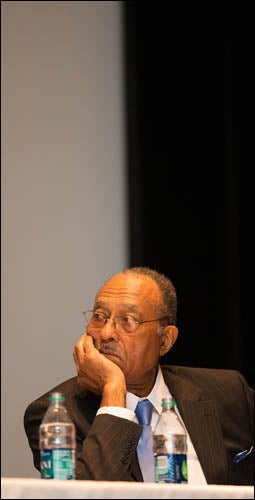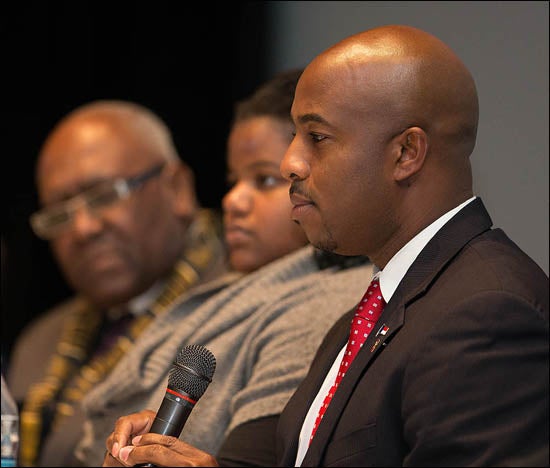POSITIVE CHANGE
Retired justice, alumni panel discuss desegregation, diversity at ECU
East Carolina University alumni spanning several decades discussed their varied experiences with desegregation and diversity at the university during an event in Hendrix Theatre on Thursday, Nov. 1.

Justice Henry Frey listens to speakers at the ECU panel discussion on desegregation.
The keynote address and panel discussion were the first in a series of events planned throughout this academic year to commemorate the 50th anniversary of desegregation at ECU. Featured speaker Justice Henry Frye began by walking those attending the event though the court cases that predated desegregation, including Plessy v. Ferguson and Brown v. Board of Education.
He mentioned that the Supreme Court of the United States is considering this year how race plays a factor in admissions to create diversity, and added that he “hopes for clarity” on the law this term.
He also spoke briefly about how after desegregation, even at ECU, there were challenges yet to overcome. Former chancellor Leo Jenkins aided in setting things right during that period, Frye said.
“Positive change does not come about by osmosis,” he continued. “Positive change comes about when somebody looks at a situation and says, ‘This needs to be changed. This needs to be better.’ And they set to work to make things better.”
Frye noted the number of first African-American students who returned to college campuses across the state this year and received “warm welcomes.” That included Laura Marie Leary Elliott – the first African-American admitted to East Carolina University, then East Carolina College, as a full-time student.
Most of those taking the stage after Frye’s address were also ECU alumni: Dennis Chestnut, Class of 1969; Angela Allen, ’81; and Chris Rey, ’03.
“My dream could have easily been deferred if not for the doors opened by people like Mrs. Elliott,” remarked Allen, referencing the poem “What Happens to a Dream Deferred” by African-American poet Langston Hughes. Frye read the poem during his address.
“I had come here with a purpose,” said Chestnut. “I meant to achieve it one way or another.”
An exception was ECU junior Chantel Miller, who spoke candidly among her distinguished company about the diversity she sees at ECU today.
“I looked around the campus and I felt that I was welcomed,” she said about her arrival at ECU. “I have friends of every ethnicity. I feel like things have changed. I don’t feel hindered, and that’s the best part of being here.”
That was shared in contrast to the experiences of other panelists including Rey, who expressed concern over the racial hate still taught in many homes by older generations.
“We were not in some post-racial world,” he said. “Make sure you don’t still have your rose-colored glasses on.”
But Rey, now mayor of Spring Lake, also discussed successes including getting a step show he was involved in moved from Hendrix Theatre into the more prominent Wright Auditorium.
“I just realized the power of coming together,” he said. “We were on and popping after that, fighting battles all over campus.”
ECU Historian Dr. John Tucker also participated in the discussion and advised “living up to our best ideals is and will remain a challenge.” He followed that with something his father taught him.
“Children everywhere cry in the same language,” Tucker recounted. “No matter what comes after, we begin basically in the same way.”
The panelists also discussed the support systems of family, church and friends that they had growing up and maintained through college. And they encouraged the audience to get involved and offer opportunities for learning and exploration to young, African-American students.
Lathan E. Turner, interim director of the Ledonia Wright Cultural Center, served as moderator.
More information about events scheduled around the 50th anniversary of desegregation at ECU is available online at https://www.ecu.edu/cs-admin/mktg/50years_desegregation.cfm.

ECU graduate Chris Rey, the youngest elected mayor of Spring Lake, served as a student leader while at ECU. Pictured above at right, Rey speaks during the panel presentation on desegregation.
